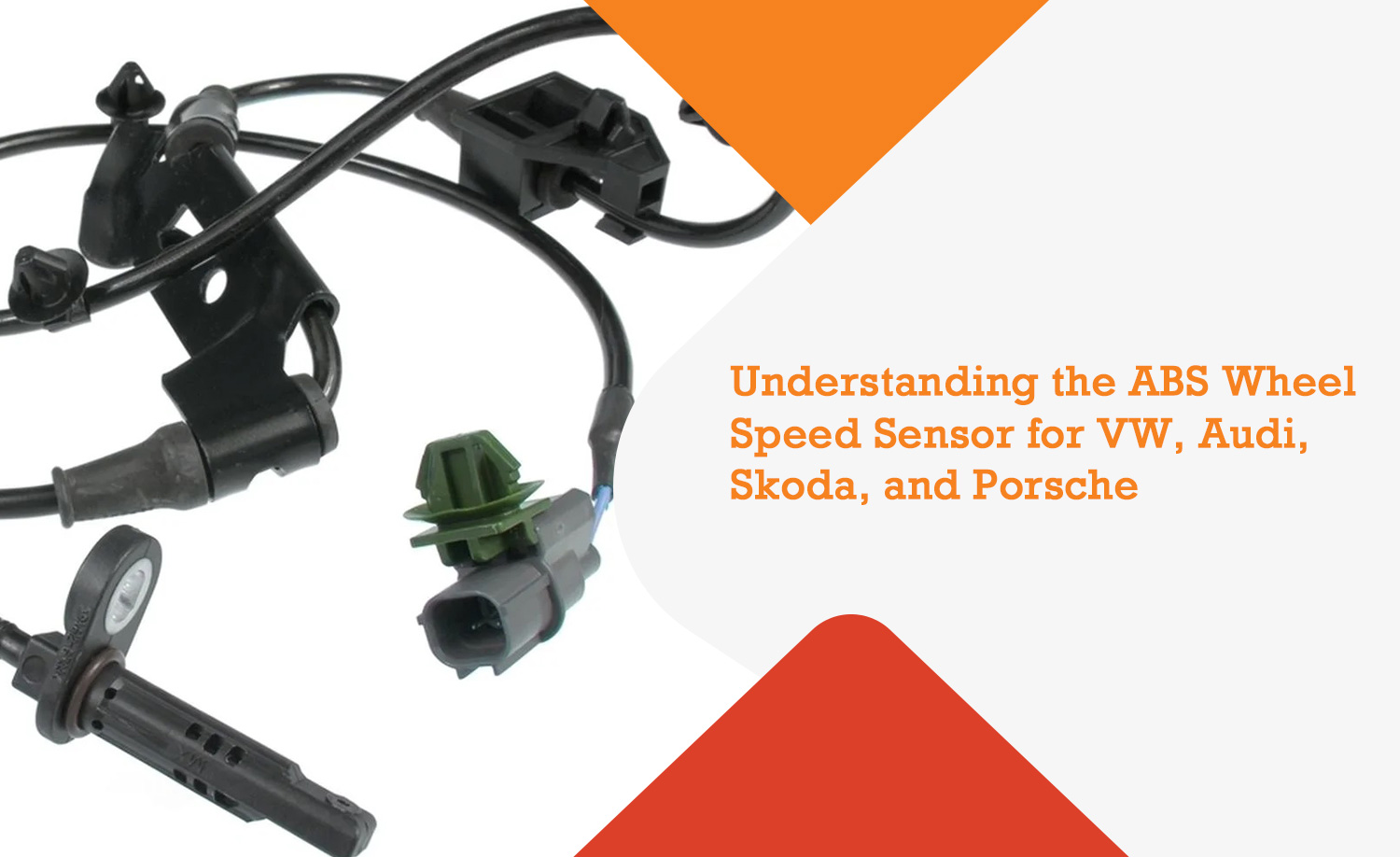In order to guarantee efficiency, performance, and safety, modern cars mostly depend on cutting-edge technologies. The ABS (Anti-lock Braking System) wheel speed sensor is one of the many parts that are essential to car safety systems. This little but effective gadget, which is included in vehicles made by VW, Audi, Skoda, and Porsche, is crucial for preserving control when braking and guaranteeing that different vehicle systems are operating as intended.
Knowing the ABS wheel speed sensor can help you appreciate its importance and identify when it might require maintenance if you own a car from one of these brands. Let’s examine its functions, operation, and importance to your driving experience.
An ABS Wheel Speed Sensor: What Is It?
An essential part of the Anti-lock Braking System is the ABS wheel speed sensor. It is intended to track each wheel’s rotational speed and communicate this data to the Electronic Control Unit (ECU) of the car. In order to prevent skidding, the ECU uses this data to identify whether one or more wheels are locking up while braking and modifies the brake pressure appropriately.
Apart from its function in the ABS, the wheel speed sensor also supplies information to other systems, including electronic stability control and traction control. It basically makes sure that the car stays steady and manageable in a variety of driving situations.
How Does It Operate?
The ABS wheel speed sensor measures wheel rotation using optical or magnetic technology. The majority of sensors are positioned close to a tone or toothed ring that is fastened to the wheel hub. The ring’s teeth move past the sensor as the wheel revolves, producing a signal that shows the wheel’s speed.
The ECU receives this signal and continuously examines the information from all four wheels. The ECU intervenes by adjusting the brake pressure to keep any wheel from locking up if it notices a noticeable variation in wheel speeds while braking.
The ABS Wheel Speed Sensor: Why Is It Important?
- Promotes Safety
The ABS wheel speed sensor’s main job is to keep the wheels from locking up when applying severe braking. A car with locked wheels may skid uncontrollably, particularly on slick surfaces. The sensor helps to reduce stopping distances and promote safer braking by making sure the wheels maintain traction. - ADAS (Advanced Driver Assistance Systems) are compatible
The ABS wheel speed sensor in contemporary cars supplies vital information for features like electronic stability control, traction control, and hill-start assistance. The sensor is an essential component of your car’s overall safety system since these systems depend on precise wheel speed readings to operate. - Improves Vehicle Handling
By minimising skids and ensuring consistent traction, the ABS wheel speed sensor helps retain control of the vehicle during fast bends, rapid stops, or demanding road conditions. This is particularly crucial for high-performance companies like Porsche and Audi, where precision handling is a top priority.
Typical Signs of an ABS Wheel Speed Sensor Problem
The ABS wheel speed sensor may eventually wear out or malfunction, just like any other part of the car. You may take care of the problem before it compromises your safety by being aware of the warning indications of a faulty sensor. These are a few typical symptoms:
- The ABS Warning Light
The ABS warning light on the dashboard will turn on if the ECU finds a fault with one or more wheel speed sensors. This is frequently the initial indication of a sensor problem. - Warnings about Traction Control or Stability Control
Because the wheel speed sensor feeds information to several systems, a malfunction may cause warning lights for electronic stability control or traction control to illuminate. - Absence of ABS Performance
Longer stopping lengths and a higher chance of skidding while applying strong braking can result from the ABS failing due to a malfunctioning sensor. - Unreliable Speedometer Data
In certain cars, the speedometer receives data from the ABS wheel speed sensor as well. Inaccurate or inconsistent speed measurements could be the result of a malfunctioning sensor.
ABS Wheel Speed Sensor Failure Causes
An ABS wheel speed sensor may malfunction for a number of reasons, such as:
Dirt and Debris: Because the sensor is close to the wheel hub, dirt, mud, and road debris can contaminate it. This may eventually cause it to malfunction.
Corrosion: Signal disruptions may result from the sensor or its connections corroding due to moisture and road salt.
Physical Damage: Impacts like striking a pothole or road debris can harm the sensor or its wiring.
Wear and Tear: Heat, vibration, and normal use can cause the sensor to deteriorate over time, just like any other electronic component.
Changing a Wheel Speed Sensor with ABS
It’s critical to replace your ABS wheel speed sensor as soon as possible if it malfunctions. Driving with a malfunctioning sensor might affect your car’s stability and braking systems, increasing your risk of collisions.
The cost of replacement varies according to your car’s make and model. A new sensor for a VW, Audi, Skoda, or Porsche can cost anywhere from $50 to $200, plus additional labour for installation. Although professional installation is advised to guarantee correct calibration, some auto enthusiasts with mechanical expertise may decide to change the sensor themselves.
Selecting the Appropriate Sensor
Selecting a high-quality component that works with your car is crucial when replacing an ABS wheel speed sensor. Since OEM (Original Equipment Manufacturer) sensors are made especially for the make and model of your car, they are frequently the best option. Although aftermarket sensors can be less expensive, it’s crucial to make sure they adhere to the same specifications as the original component.
How to Take Care of Your ABS Wheel Speed Sensor
Regular maintenance is essential to extending the life of your ABS wheel speed sensor. You may avoid dirt and debris interfering with the sensor’s function by keeping your wheels and hubs clean. Ask your mechanic to look for wear or corrosion on the sensors and their connections during regular vehicle checkups.
Although it may not be the most noticeable component of your vehicle, the ABS wheel speed sensor plays a crucial purpose in maintaining both performance and safety. Understanding and keeping up with this important component can significantly improve the driving experience for owners of VW, Audi, Skoda, and Porsche automobiles. A dependable ABS wheel speed sensor is your silent companion, operating in the background to keep you safe whether you’re navigating winding mountain routes or driving downtown streets.

